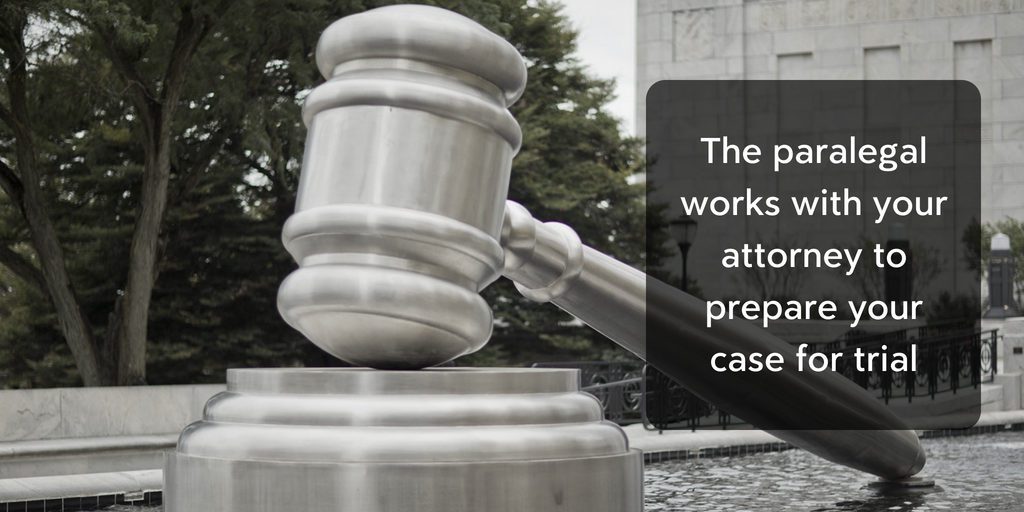
When you first start a personal injury case, you may be confused about many things. Brooks Law Group is here to make the process easy and stress-free for you. One of the ways we do this is through our amazing case managers and paralegals. But what’s the difference between case managers and paralegals? Let’s break down what those two positions handle, and what that means for you.
You can find these staff members at our offices in both Winter Haven and Tampa, so you can be assured that they are close and convenient for you. The personal injury paralegal works directly under the lawyer maintaining multiple calendars, balancing numerous cases and filing legal documents. The case manager works more with the insurance company, medical providers, and the client through the treatment process. If the case settles before litigation, they handle the closing process as well. Both our paralegals and case managers are ready to do anything to help our clients.
Case Managers
The First Steps of a Case
The process of a personal injury claim can vary greatly depending on the type of accident or injury sustained. Most cases begin with the intake of your information where you typically review the details of your claim with an intake specialist. The intake specialist will then work directly with the attorney in determining which paralegal or case manager will handle your file.
The next step is to begin treatment–this is what a case manager will help you with. The case manager acts as a liaison between the lawyer, the medical providers, and the clients. The case manager is your first point of contact in a personal injury law firm. They also work directly with the attorney.

Getting Treatment During Your Case
Many times, people don’t have health insurance or the cash to see a doctor or chiropractor. A case manager will assist the attorney in drafting a Letter of Protection (LOP). The LOP is a promise to the medical providers for payment once your case settles, the payment will come out of your final settlement. This will let you get the care you need while your case is in progress.
The next letter is a Letter of Representation (LOR). The LOR notifies your insurers and the defendant’s insurer that an attorney is representing you and that all communication must go through the attorney’s office. Your assigned case manager will also request all medical records and your background history. It’s important that you’re honest with your case manager and attorney from the start as they look into your history. This will help protect against insurance adjusters and defense attorneys who will also be looking into your past. Being upfront and honest with your case manager allows them to strengthen your case.
The case manager will set you up with an appointment to meet with your attorney soon after getting your case started. This allows time for the case manager to gather all necessary records and compile a thorough case for the attorney to review. The case manager also orders your work/employment records if you have missed work due to the injury, as well as requested compensation for your money and time travelling to treatment facilities. Your case manager obtains witness testimony and PIP information, and documents all correspondence as you just worry about getting better.
Settlement Demands
From the start of your case, a lot has happened within a few months. The case manager should have all of your documents, treatments, diagnosis, statements, and appointments out of the way once you are done with treatment. Then, the real fun begins. The settlement demand is prepared and sent to the attorney for review. The attorney advises the case manager on which tactics to use, which questions to ask, and what to steer away from.
The attorney is the safety net, always available for the benefit of the client and the firm. Once the settlement demand is reviewed and edited by the attorney, it is then mailed to the insurance company. It’s called a demand because the case manager is demanding the insurance company to not only acknowledge liability, but also compensate you for the injury.
Depending on the demand response from the insurance company, the case manager will begin negotiating with them for a settlement. Many factors impact the settlement agreement, such as how much insurance the defendant had, as well as how badly injured you are from the accident. If an agreement cannot be reached with the insurance company, the attorney will meet with the client to discuss other options, such as litigation, to get you a proper recovery. Sometimes, but not often, the insurance company settles for the exact amount demanded. Most often, the insurance company will dispute certain aspects of the claim if they simply don’t want to pay full amounts.
After the Case Settles
Once the case settles, the case manager will begin negotiating liens and costs with various agencies and medical providers. They begin by contacting the health care and treatment providers and request that they lower your cost of service. Case managers do this to help you receive more net money in your pocket. It is the attorney’s job to ensure that you reach the best settlement. Furthermore, if you have health insurance coverage through Medicare or Medicaid, the case manager must follow a government-mandated procedure in requesting negotiations and reductions.
The case manager will prepare all health insurance disclosure documents, assist the attorney in negotiating all liens and obtain cost information from the law firm’s bookkeeper. The attorney will review the final closing documents and set an appointment for the client to come in and sign them. You will receive the balance of your settlement after the attorney’s fees, firm costs and medical providers are paid.
Once you receive your check you are good to go–but our work is not done on your case. The next step is for the case manager to close out your file by storing or shredding documents pertaining to your case. The attorney approves the closure of your case; the law firm will give you any records you want to keep before destroying your file. The law firm only has to maintain minimal records. We will either give the rest of your file to you or destroy it. Following Florida Bar guidelines, any remaining portion of your file will only be stored for 7 years before it is completely destroyed for your privacy.
Paralegals
Litigation Preparation
If you cannot reach settlement, then the attorney will notify the litigation paralegal that a lawsuit will need to be filed. Your case manager will meet with the attorney and paralegal to review the details of your claims. The paralegal will then take over your case and assist the attorney in filing a lawsuit by submitting a formal complaint to the court against the defendant and/or his or her insurance company. This procedure requires a lot of paperwork and timing.
Once the complaint is filed, the paralegal will begin working on your discovery with the attorney. Discovery involves interrogatory questions to the opposing party, document production from the opposing party, and testimony under oath of all key witnesses in the case. The paralegal will also respond to interrogatories and requests from the defendant. These documents can be basic information such as driver’s licenses, insurance information, medical records and bills.
Depositions
As the case moves along, the paralegals for each attorney will coordinate and schedule a deposition. A deposition is an out-of-court sworn testimony. The paralegal must work with two or more attorney calendars as well as the court’s availability to get these scheduled. Many times it is reduced to writing, known as a deposition transcript, so that it can be used in court. Once they schedule the depositions, your attorney will meet with you to review the procedure, as well as your expectations.

Next, the paralegal will coordinate a mediation with opposing counsel and the mediator. This process is designed to give all parties involved the best chance at resolving the case prior to trial. This would save the expense of taking a case to a jury. A court mediator is a lawyer who uses unbiased tactics to mediate between parties. The objective is to reach settlement. If they do not reach settlement during mediation, then the parties get ready for the long haul. But not to worry, our paralegals and attorneys will keep you updated and reassured throughout the process.
The Trial
If the case does not settle, the judge will set a trial week. At trial your attorney presents your side of the case in front of a jury. The paralegal is the backbone of your case, and they stage the whole court process. They work with the attorney to line up witnesses, issue subpoenas, coordinate medical professional testimony, and prepare trial exhibits. Case managers deal with the initial intake and management of the case through the pre-litigation process. Then the paralegal takes over and handles the file once litigation has been filed. The attorney is constantly communicating about your case with the paralegal and the case manager.
As you can see, it takes a special type of person to be passionate in the personal injury field. The process of handling a personal injury claim, whether it is from a vehicle accident or a slip and fall, is very detailed. Some cases open and close within a matter of several months, while others are a slow battle for years. Your case outcome is dependent on the evidence available and the tenacity of the law group you hire. Quick minded, detailed-oriented, thorough people are the best kind of people to be handling your case. We strive to always offer the best client experience possible, no matter who is handling your case. If you’re ready to talk about your case and meet your case manager or paralegal, click here to contact us today.













